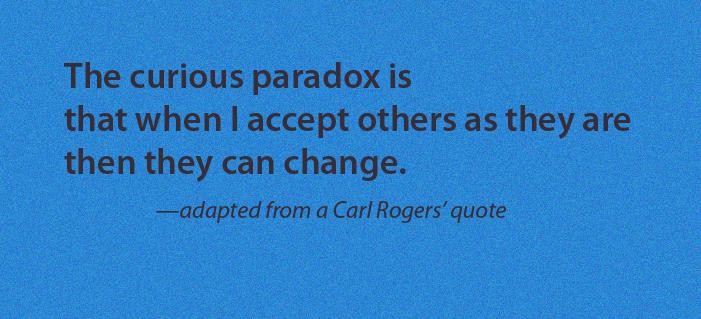From The Counselling Suite

From The Counselling Suite
Unconditional Positive Regard
Unconditional positive regard (UPR) is a concept developed by American Psychologist and founder of the humanistic, client-centred approach to psychotherapy, Carl Rogers (1902-1987). It differs from unconditional love, in that a UPR attitude does not involve feelings of love, warmth and affection and it is not equivalent to “liking” someone, as people commonly mistake it. UPR involves accepting and valuing another person and treating them with respect, even when they have said or done something questionable. That is, positive regard is not withdrawn if the person does something wrong or makes a mistake.
The consequences of unconditional positive regard are that the person feels free to try things out and make mistakes, even though this may lead to worsening things at times. Conditional positive regard, by contrast, is where positive regard, praise and approval, depend on the child, for example, behaving in ways that the parents think are correct. The child is only accepted and treated with respect when he/she behaves in ways approved by the parent. At the extreme, a consequence of someone who has only experienced conditional positive regard as a child is that they may constantly seek approval from other people and they may fear absolute social rejection if they make mistakes or do something wrong.
UPR is based on the philosophical view that humans have an innate urge towards socially constructive behaviour which is always present and functioning at some level. Carl Rogers also believed that each person has a need for self-determination, and the more that a person’s need for self-determination is respected, the more likely their innate urge to be socially constructive will take hold. UPR therefore means valuing that a person is doing their best to move forward in their lives constructively, and respecting the person’s right to self-determination, no matter what they choose to do. Once again, it is important to reiterate that this does not mean that you need to “like” the person or approve of what they do, nor do you need to put up with what they do if you perceive it as dangerous in some way. It is also not about being nice to people, smiling at them and nodding. Rather, it is an attitude from which the behaviours will follow.
There is broad application of UPR in counselling contexts and it is often applied to parenting. In a counselling context, it is not always easy to maintain UPR, particularly when a person is making negative or harmful choices on a recurring basis. One way to overcome this is to strike a balance between remaining non-judgmental and highlighting to the client that their behaviour is harmful to themselves or others to promote self-awareness.
Although it can be challenging, particularly when faced with students who have done horrible things, teachers can also adopt an attitude of UPR, which can help to create nurturing classroom environments. A UPR attitude to teaching recognises that students are valuable people, deserving of their human rights to an education (rather that treating students as though what the teacher has to offer them is conditional on them always doing the right thing). Examples of how UPR can be applied in a classroom setting, based on educational research, include teachers being: available (posting and sticking to office hours); discreet (keeping sensitive information confidential); fair (treating all students equally, grading equitably and avoiding favouritism); consistent (having clear boundaries); and benevolent (never doing anything to take advantage of students, make them lose face or embarrass them in front of others). A UPR attitude can also include not ‘writing off’ students who misbehave, not taking student misbehaviour personally, and distinguishing between behaviours and a student’s worth or value as a person.
Dr Lucinda Clifford
School Psychologist
Ms Cathie Oswald
Counsellor

